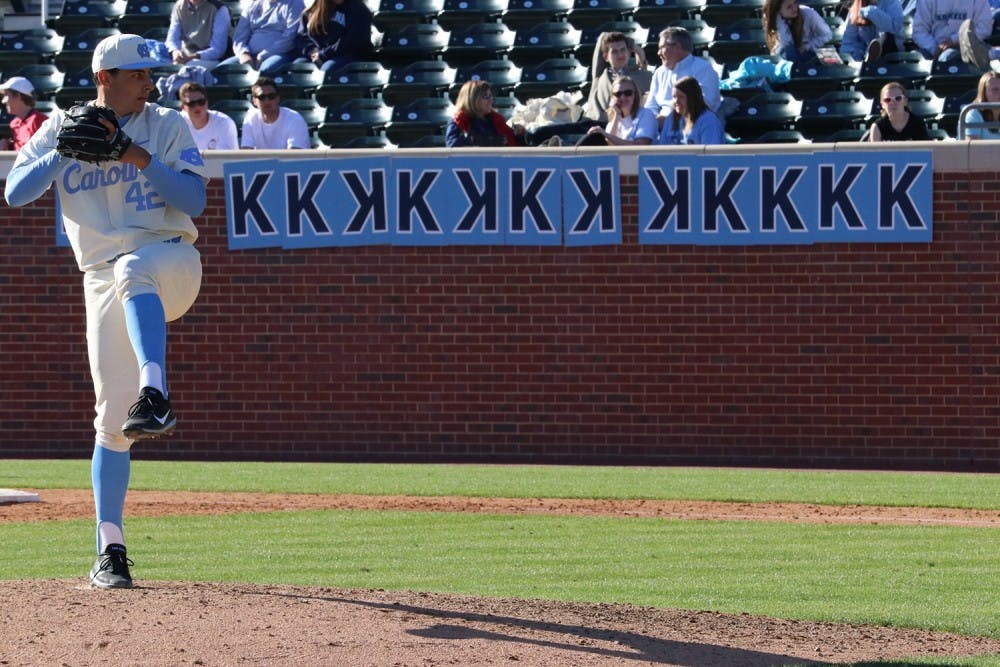But after a game last March, the UNC head coach admitted, “He’s better than I thought he was.”
Those words came after Dalatri surrendered a single run in 8.1 innings of work against Virginia in his first ACC start. Two weeks earlier against Radford, he struck out 15 batters on just 98 pitches, becoming the first Tar Heel since Matt Harvey in 2010 to do so.
“It was like a video game calling pitches,” pitching coach Robert Woodard said. “If we called it, he threw it. If wanted to strike a guy out looking, he did it. If we wanted to strike a guy out swinging, he did it.”
Those early-season performances set the tone for a year that ended in consensus Freshman All-American honors. The 6-foot-6 Dalatri began the season as UNC’s Sunday starter but one series later moved into the Saturday role, one he never gave up. By season’s end, he posted a 3.34 ERA and finished 7-3, emerging as a complement to eventual first-round pick J.B. Bukauskas.
“I made sure I wouldn’t hold myself back from any opportunity because, at the time, I didn’t know what my role was going to be,” Dalatri said. “I wanted there to be nothing left in the ballpark that I could control.”
In a team-high 97 innings, Dalatri only walked 19 batters and pitched through seven innings in seven of his 15 starts.
“Dude throws strikes, and that’s why he’s so good,” senior teammate Zack Gahagan said.
But in addition to those tangible aspects of his game, he brought something else to the table that not many first-year pitchers do: maturity. To understand where that came from is to understand his upbringing.
***
At age 10, Dalatri was ending his practice routine in his backyard with 10 straight strikes.
The next year, he had to finish bullpen sessions by throwing five consecutive strikes with his eyes closed, a directive that came from his father, Rich.
Among the other training tactics Gianluca performed as a youth, he also had to throw his fastball for a strike 10 times in a row before he could learn a new pitch.
“It’s something Americans have missed the boat on in youth sports,” Rich said. “You’ve got to get past stage A before you can go to stage B. And you’ve got to get to stage B before you can get to stage C.”
To get the day's news and headlines in your inbox each morning, sign up for our email newsletters.
Rich is the type of person who would know. Rich became the NBA’s first ever full-time strength and conditioning coach when he joined the New Jersey Nets staff in 1987. He worked with the Nets through Gianluca’s eighth-grade year, which gave his son a glimpse of how professional athletes carry themselves.
By being around someone like 10-time All Star Jason Kidd, Gianluca learned the value of preparation. He vividly remembers being confused by Kidd putting himself through tough leg workouts on game days. After a while, he figured out why, and the answer stuck with him.
“Maybe it’s not the best thing for his body physically, but mentally if you feel like you’re ready, you’re ready,” he said. “And no level of fatigue will push you back if you’re prepared for what you’re about to do — and that’s baseball 101.”
By the time he arrived at UNC, Gianluca had already established the type of habits he learned from Kidd. It didn’t him long to impress the UNC coaching staff with his professionalism. Fox said there are three types of maturity: physical, intellectual and emotional. His new pitcher from Wall Township, N.J., checked all of the boxes.
“Luca had it,” Fox said. “Just mature, all the way around.”
Woodard said Gianluca has a skill for quietly acquiring knowledge when others may not notice it. Within a game, his attention to detail has led to consistency, in both his throwing motion and his mental approach.
His NCAA tournament start against Michigan was an example of that. In the second inning, he gave up a home run and allowed two more runners to reach base. He hadn’t done much wrong, so he avoided punishing himself mentally. Instead, he regrouped, got out of the inning unscathed and went on his way.
“He doesn’t give a rat’s ass about anything,” Rich said. “He is the most easy-going kid. Nothing bothers him, and that’s why he’s a good pitcher.”
***
According to Fox, successful first-years need to be prepared for more difficulty as sophomores. Dalatri has acknowledged as much.
“If I go out there and try to do the same things I did last year, the odds are maybe I don’t do as well,” Dalatri said, “and then that would be a failure.”
So this offseason, Dalatri got to work. In the summer, he played for USA Baseball’s Collegiate National Team and had a 3.27 ERA in three starts. Personally, he focused on generating more power with the lower half of his body, developing his curveball and pitching aggressively to lefties. He’s also trying to vary his delivery to mess with a hitter’s timing.
Mechanically, Dalatri will continue to evolve as a pitcher. But his focused mindset and obsession with the game is something that’s been unchanged.
Rich recalled how his son approached his high school head coach, Marty Kenney, before he had played in a single game to ask about when he was going to pitch. He had workouts and routines to schedule.
“He hasn’t changed,” Rich said.
A week ago, before a team scrimmage, Fox joked that if his players performed poorly, he was going to blame it on the UNC-Duke men’s basketball game the night before. Did Dalatri celebrate the victory the same way some of his teammates did?
“Nah, I didn’t rush Franklin or anything like that,” he said. “I went to bed. I had to pitch today.”
Dad was right. He hasn’t changed.
@brennan_doherty
@DTHSports | sports@dailytarheel.com




